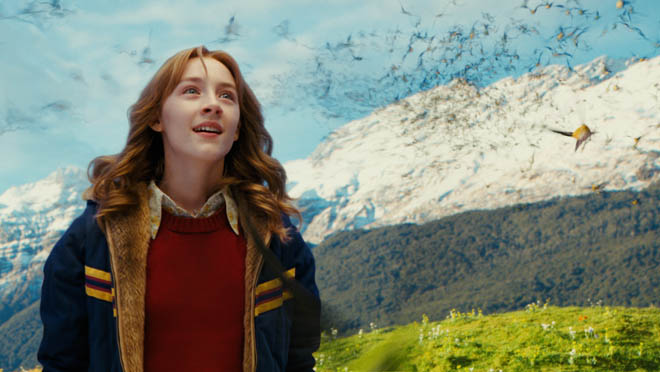When Peter Jackson makes a film, he delivers adventure, wacky hi-jinx, worlds brimming over with people-farming aliens, psychotic drug addled muppets, the undead in droves, murderous, teenaged girls, six gun wielding ghosts, orcs and giant Lost World beasties. This is a man who spent huge portions of a budget on karo syrup so he could unleash a lawnmower on a crowd of zombies, dispensing with them in showers of blood. He has kept his own brain from slipping out of his head by using his scarf to hold a flapping skull in place. This little Kiwi is a man who is familiar with the dark and the macabre, the funny and the frightening.
His love for special effects started at an early age, and these are skills that he has continued to hone throughout his career. In the documentary Good Taste meets Bad Taste, talking about his love of special effects, and particularly Bad Taste, his mother reflects "I think the horror part came in because he saw that as the market that he could get into." There’s a lot in that statement. At 25 Jackson gained international acclaim for Bad Taste with its outlandish, inventive effects, and followed it up with Meet the Feebles and Braindead. However, the moment he got some real money behind him, he changed tack dramatically and wrote Heavenly Creatures, a film so different from his three previous outings that it is often sadly forgotten or disregarded. Nonetheless, it gained the attention of Miramax who obtained distribution rights, which ultimately contributed to Jackson’s first Academy Award Nomination, for the screenplay.
With faith from the industry came a new kind of creative freedom, and with better funding the now-more-adventurous Kiwi looked beyond the safety of horror and made Forgotten Silver. In it, he recounts the story of fellow countryman, Colin McKenzie, New Zealand’s first film maker – who challenged both D.W. Griffith’s and Orson Welles’ claims to the throne of Greatest Director and Cinematic Visionary of All Time. According to this hour long venture, McKenzie not only accidentally filmed the first manned flight eight months prior to the Wright Brothers, but shortly thereafter invented a way to synchronise sound with the moving picture, resulting in the world’s first feature length film. McKenzie subsequently invented a process where he could colourise film years before Technicolor… and so the fantasy continues.
For a variety of reasons the brilliant, yet unfortunate, inventor never received the recognition he deserved – until, that is, Jackson stumbled upon an old forgotten trunk full of reels of silver halide, and presented his findings to a prime time audience in New Zealand. The film caused quite a stir amongst the population of this sometimes overlooked and forgotten island, the nation’s collective chest puffed with pride, but quickly deflated when it became clear that this was merely a tongue-in-cheek gag and what has since been called the greatest cinematic hoax of all time. A truly fantastic mockumentary, Forgotten Silver is quite obviously a bit of fun, a personal film for and about Jackson’s fascination with his trade.
But it is also a statement by the Splatstick King that he is not all about blood and guts. Much like Heavenly Creatures, this light-hearted, short film received great praise and yet still falls behind the mental DVD shelf to collect dust and further the myth that all Jackson can, and should, do is monsters and fantasy.
Innovative, daring, imaginative and breathtaking are words often used to describe Jackson’s films and, along with Guillermo del Toro, there are few within their spectrum that could even dream of challenging their crowns. The upcoming Hobbit films will see the two of them finally join forces in what one can only imagine may very well be mind-melting: Cameron ain’t got shit on this.
Rarely having faltered by surrounding himself with orcs, zombies and whimsical eye-gouging jokes, when it comes to the bottom line he is the Fantasy King and you can understand how that might irk some people. Moreso, as history has proven, regardless of how great the film may be, if Jackson ventures too far outside of his perceived safe zone, the film is quickly forgotten. Or, as in the case of his latest venture, The Lovely Bones, dismissed as a sad attempt to expand his horizons, pander to the Hollywood crowd, make a film for teenage girls, or even selling out.
So now we find Peter sheilding himself from cries of "get back to your roots!" But I’m sorry to say that often, it seems, when a director goes "back to his roots," they tend to fall face first onto a pile of VHS’s, which one can only imagine feels similar to stepping on a lego brick with bare feet. Examples? George Lucas fucked the shit out of Star Wars. Speilberg let weirdo CGI ants run riot through Indiana Jones and the fans wandered away in baffled disappointment. I would even go so far as to say that when Sam Raimi "went back to his roots" his was our the biggest disappointment of them all. Drag Me to Hell was a dire mess of the obvious; if you didn’t see every jump scare and plot turn coming before you even sat down you may very well have been watching a different film altogether.
What we, as the movie going public, want is to witness these directors learn and grow over time, not remain stagnant. Indeed with each successive film Jackson has progressed by leaps and bounds, save perhaps for King Kong, which one might suspect suffered from The Lord of the Rings burn out(like much of the world did, after one epic film stretched over 10 years of production, three years of release and nine hours of ass-on-seat time.)
In The Lovely Bones he plays out his darkest, most macabre, and most mature film to date, exploring the afterlife and life in ways he never has before. He slips in classic Jackson moments, letting you know that he is still there – subtly referencing his own films, yet dealing with the murder and rape of a 14-year-old girl with the due respect and gravity it deserves. He knows his trade, he knows his tropes, and he wants us to know that this is not what you expected. Throughout the film he hints at his own juvenile mistakes, and then quickly runs back to close that door. The Lovely Bones may very well be a film that he has been trying to make for years. Set in the 1970s it continues Jackson’s love of period pieces and, never one to shy away from a challenge, he has now chosen to tackle not only a well-loved book, but a multi-layered psychological drama and make it his own. Whether his attempt is successful or not may depend largely on how you approach film adaptations of books. As a standalone film it proves suspenseful, beautiful, sad and uplifting in equal measure. As an adaptation of the book, well, Jackson himself has admitted that they had to drop material like nobody’s business to reduce Alice Sebold’s complex novel to a manageable story of grief and overcoming it. Unlike his earlier films, that twinkle is gone and the tongue is no longer tucked into his cheek. It may have holes in it, it may not be perfect, it may not be funny but it is Peter Jackson’s latest film in every way.
Josh Saco puts on cult film night Cigarette Burns – first Monday of every month at the Mucky Pup pub in London, N1. Free Entry! Starts 7.30pm. Horror-themed movie food also available. For more information head to the Cigarette Burns blog here.



